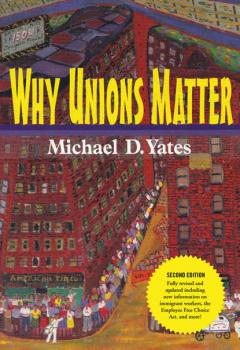Michael D. Yates
Список книг автора Michael D. YatesWhy Unions Matter
In this new edition of Why Unions Matter , Michael D. Yates shows why unions still matter. Unions mean better pay, benefits, and working conditions for their members; they force employers to treat employees with dignity and respect; and at their best, they provide a way for workers to make society both more democratic and egalitarian. Yates uses simple language, clear data, and engaging examples to show why workers need unions, how unions are formed, how they operate, how collective bargaining works, the role of unions in politics, and what unions have done to bring workers together across the divides of race, gender, religion, and sexual orientation. The new edition not onlyupdates the first, but also examines the record of the New Voice slate that took control of the AFL-CIO in 1995, the continuing decline in union membership and density, the Change to Win split in 2005, the growing importance of immigrant workers, the rise of worker centers, the impacts of and labor responses to globalization, and the need for labor to have an independent political voice. This is simply the best introduction to unions on the market.
Can the Working Class Change the World?
One of the horrors of the capitalist system is that slave labor, which was central to the formation and growth of capitalism itself, is still fully able to coexist alongside wage labor. But, as Karl Marx points out, it is the fact of being paid for one's work that validates capitalism as a viable socio-economic structure. Beneath this veil of “free commerce” – where workers are paid only for a portion of their workday, and buyers and sellers in the marketplace face each other as “equals” – lies a foundation of immense inequality. Yet workers have always rebelled. They've organized unions, struck, picketed, boycotted, formed political organizations and parties – sometimes they have actually won and improved their lives. But, Marx argued, because capitalism is the apotheosis of class society, it must be the last class society: it must, therefore, be destroyed. And only the working class, said Marx, is capable of creating that change. In his timely and innovative book, Michael D. Yates asks if the working class can, indeed, change the world. Deftly factoring in such contemporary elements as sharp changes in the rise of identity politics and the nature of work, itself, Yates asks if there can, in fact, be a thing called the working class? If so, how might it overcome inherent divisions of gender, race, ethnicity, religion, location – to become a cohesive and radical force for change? Forcefully and without illusions, Yates supports his arguments with relevant, clearly explained data, historical examples, and his own personal experiences. This book is a sophisticated and prescient understanding of the working class, and what all of us might do to change the world.
Wisconsin Uprising
In early 2011, the nation was stunned to watch Wisconsin’s state capitol in Madison come under sudden and unexpected occupation by union members and their allies. The protests to defend collective bargaining rights were militant and practically unheard of in this era of declining union power. Nearly forty years of neoliberalism and the most severe economic crisis since the Great Depression have battered the labor movement, and workers have been largely complacent in the face of stagnant wages, slashed benefits and services, widening unemployment, and growing inequality. That is, until now. Under pressure from a union-busting governor and his supporters in the legislature, and inspired by the massive uprisings in Tunisia and Egypt, workers in Wisconsin shook the nation with their colossal display of solidarity and outrage. Their struggle is still ongoing, but there are lessons to be learned from the Wisconsin revolt. This timely book brings together some of the best labor journalists and scholars in the United States, many of whom were on the ground at the time, to examine the causes and impact of events, and suggest how the labor movement might proceed in this new era of union militancy.


